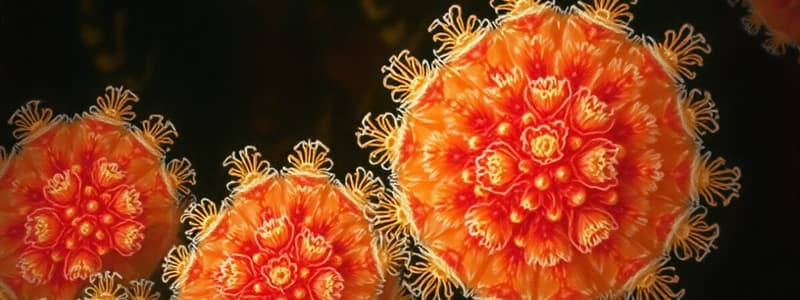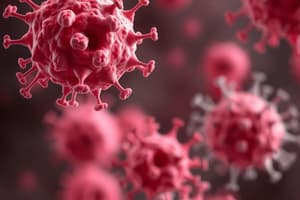Podcast
Questions and Answers
What is the primary focus of Lecture 16?
What is the primary focus of Lecture 16?
- Introduction to mammalian cells
- Contamination control in laboratories
- Overview of the Immune System (correct)
- Nutrient uptake in cell culture
Which of the following lectures discusses cell culture media?
Which of the following lectures discusses cell culture media?
- Lecture 11 (correct)
- Lecture 15
- Lecture 13
- Lecture 9
In the content provided, which type of immunity is discussed in Lecture 15?
In the content provided, which type of immunity is discussed in Lecture 15?
- Passive immunity
- Adaptive immunity
- Innate immune response (correct)
- Active immunity
What is a main goal of discussing adaptive immunity?
What is a main goal of discussing adaptive immunity?
Which cells are primarily involved in cell-mediated immunity?
Which cells are primarily involved in cell-mediated immunity?
What will be recapped in the week following the lectures on cell culture media?
What will be recapped in the week following the lectures on cell culture media?
During which week is the Revision scheduled?
During which week is the Revision scheduled?
What is a focus of Lecture 9?
What is a focus of Lecture 9?
What is a key characteristic of adaptive immunity?
What is a key characteristic of adaptive immunity?
Which type of immunity involves the development of your own antibodies?
Which type of immunity involves the development of your own antibodies?
What type of T cells assist in activating cytotoxic T cells?
What type of T cells assist in activating cytotoxic T cells?
What type of immunity provides rapid response due to 'memory' against pathogens?
What type of immunity provides rapid response due to 'memory' against pathogens?
Which cells are primarily responsible for humoral immunity?
Which cells are primarily responsible for humoral immunity?
How can passive immunity be acquired?
How can passive immunity be acquired?
What happens to naive T cells when they come into contact with an antigen?
What happens to naive T cells when they come into contact with an antigen?
Which type of immunity can be artificially induced?
Which type of immunity can be artificially induced?
What is the primary function of IgG antibodies?
What is the primary function of IgG antibodies?
Which antibody class is primarily involved in allergic reactions?
Which antibody class is primarily involved in allergic reactions?
What is the function of opsonization by antibodies?
What is the function of opsonization by antibodies?
Which antibody is the first produced following an initial antigen exposure?
Which antibody is the first produced following an initial antigen exposure?
What mechanism do antibodies use to promote agglutination?
What mechanism do antibodies use to promote agglutination?
How do antibodies neutralize viruses or bacterial toxins?
How do antibodies neutralize viruses or bacterial toxins?
What role does IgA play in the immune system?
What role does IgA play in the immune system?
What does ADCC stand for and how does it function?
What does ADCC stand for and how does it function?
What is the primary function of active cytotoxic T-cells?
What is the primary function of active cytotoxic T-cells?
What happens during the sensitization phase of B-cell response?
What happens during the sensitization phase of B-cell response?
What is the role of helper T-cells in B-cell activation?
What is the role of helper T-cells in B-cell activation?
What are the main types of cells that B-cells differentiate into after activation?
What are the main types of cells that B-cells differentiate into after activation?
Which component makes up the structure of an antibody?
Which component makes up the structure of an antibody?
How are antibodies classified?
How are antibodies classified?
What do memory B cells do in the immune system?
What do memory B cells do in the immune system?
What is one way that active cytotoxic T-cells destroy target cells?
What is one way that active cytotoxic T-cells destroy target cells?
What primarily happens during the primary immune response?
What primarily happens during the primary immune response?
What is a key characteristic of immunological memory?
What is a key characteristic of immunological memory?
Which process involves the direct destruction of pathogens by phagocytes?
Which process involves the direct destruction of pathogens by phagocytes?
What role do memory B cells play in the secondary immune response?
What role do memory B cells play in the secondary immune response?
Which type of adaptive immunity involves T-cells?
Which type of adaptive immunity involves T-cells?
What distinguishes the secondary immune response from the primary immune response?
What distinguishes the secondary immune response from the primary immune response?
What is the primary function of agglutination in the immune system?
What is the primary function of agglutination in the immune system?
Which class of antibodies is produced first during an immune response?
Which class of antibodies is produced first during an immune response?
What type of receptors do T cells use to recognize antigens?
What type of receptors do T cells use to recognize antigens?
Which class of MHC proteins is present in all nucleated cells?
Which class of MHC proteins is present in all nucleated cells?
What is the main function of natural killer T cells after activation?
What is the main function of natural killer T cells after activation?
What is the first step in the cytotoxic T-cell response?
What is the first step in the cytotoxic T-cell response?
Which cells are specialized antigen-presenting cells that express MHC Class-II?
Which cells are specialized antigen-presenting cells that express MHC Class-II?
What leads to the activation and division of cytotoxic T cells?
What leads to the activation and division of cytotoxic T cells?
Which of the following is NOT a type of MHC protein?
Which of the following is NOT a type of MHC protein?
What cells express MHC Class-I molecules?
What cells express MHC Class-I molecules?
Flashcards
What is the goal of lecture 16?
What is the goal of lecture 16?
The goal of lecture 16 is to understand adaptive immunity, its forms and properties, and the difference between cell-mediated immunity (T-cells) and antibody-mediated humoral immunity (B-cells).
Adaptive Immunity
Adaptive Immunity
The adaptive immune system is a specific defense mechanism that targets and remembers specific pathogens or antigens.
Forms and Properties of Adaptive Immunity
Forms and Properties of Adaptive Immunity
Adaptive immunity has two main forms: cell-mediated immunity (T-cells) and antibody-mediated humoral immunity (B-cells). These forms have specific properties: they are highly specific, have memory, and are diverse.
Cell-mediated Immunity
Cell-mediated Immunity
Signup and view all the flashcards
Antibody-mediated Humoral Immunity
Antibody-mediated Humoral Immunity
Signup and view all the flashcards
Difference between Cell-mediated and Humoral Immunity
Difference between Cell-mediated and Humoral Immunity
Signup and view all the flashcards
T-cells
T-cells
Signup and view all the flashcards
B-cells
B-cells
Signup and view all the flashcards
Passive Immunity
Passive Immunity
Signup and view all the flashcards
Humoral Immunity
Humoral Immunity
Signup and view all the flashcards
Cellular Immunity
Cellular Immunity
Signup and view all the flashcards
CD4+ Helper Cells
CD4+ Helper Cells
Signup and view all the flashcards
CD8+ Cytotoxic Cells
CD8+ Cytotoxic Cells
Signup and view all the flashcards
Memory T Cells
Memory T Cells
Signup and view all the flashcards
Cytotoxic T-cell destruction
Cytotoxic T-cell destruction
Signup and view all the flashcards
Perforin release
Perforin release
Signup and view all the flashcards
T-Cell Activation
T-Cell Activation
Signup and view all the flashcards
B-cell Sensitization
B-cell Sensitization
Signup and view all the flashcards
B-cell Differentiation
B-cell Differentiation
Signup and view all the flashcards
Antibody Structure
Antibody Structure
Signup and view all the flashcards
Antibody Constant Region
Antibody Constant Region
Signup and view all the flashcards
Antibody Variable Region
Antibody Variable Region
Signup and view all the flashcards
Natural Killer T Cells (NKT Cells)
Natural Killer T Cells (NKT Cells)
Signup and view all the flashcards
Antigen Presentation
Antigen Presentation
Signup and view all the flashcards
MHC Class-I
MHC Class-I
Signup and view all the flashcards
MHC Class-II
MHC Class-II
Signup and view all the flashcards
Cytotoxic T-cell Recognition
Cytotoxic T-cell Recognition
Signup and view all the flashcards
Cytotoxic T-cell Activation
Cytotoxic T-cell Activation
Signup and view all the flashcards
Cytotoxic T-cell Function
Cytotoxic T-cell Function
Signup and view all the flashcards
Variable Region of an Antibody
Variable Region of an Antibody
Signup and view all the flashcards
Immunoglobulin (Ig)
Immunoglobulin (Ig)
Signup and view all the flashcards
IgG Antibody
IgG Antibody
Signup and view all the flashcards
IgM Antibody
IgM Antibody
Signup and view all the flashcards
IgA Antibody
IgA Antibody
Signup and view all the flashcards
IgE Antibody
IgE Antibody
Signup and view all the flashcards
Neutralization (Antibody Function)
Neutralization (Antibody Function)
Signup and view all the flashcards
Agglutination (Antibody Function)
Agglutination (Antibody Function)
Signup and view all the flashcards
Adaptive Immune Response
Adaptive Immune Response
Signup and view all the flashcards
Primary vs. Secondary Immune Response
Primary vs. Secondary Immune Response
Signup and view all the flashcards
Immunological Memory
Immunological Memory
Signup and view all the flashcards
Study Notes
Weekly Schedule for Cell Culture Classes
- Week 1 (Tue 10th Sept): Introduction to the lecture module
- Week 2 (Mon 16th Sept): Use of mammalian cells
- Week 2 (Tue 17th Sept): Cell culture lab layout, equipment and materials
- Week 3 (Mon 23rd Sept): Contamination control
- Week 3 (Tue 24th Sept): Contamination control
- Week 4 (Mon 30th Sept): Contamination control
- Week 4 (Tue 1st Oct): Recap of lectures 2, 3, 4 and 5, along with sample assessment questions
- Week 5 (Mon 7th Oct): Nutrient uptake
- Week 5 (Tue 8th Oct): Nutrient uptake and assessment questions
- Week 6 (Mon 14th Oct): Biology of Culture Cells
- Week 6 (Tue 15th Oct): Cell culture media
- Week 7 (Mon 21st Oct): Cell culture media (postponed)
- Week 7 (Tue 22nd Oct): Lab 3 data analysis, Reading Week
- Week 8 (Mon 4th Nov): Cell culture media
- Week 8 (Tue 5th Nov): Cell Culture Media
- Week 9 (Mon 11th Nov): Growing mammalian cells
- Week 9 (Tue 12th Nov): Recap of lectures 8, 9, 10, and 11, along with sample assessment questions
- Week 10 (Mon 18th Nov): Monitoring growth
- Week 10 (Tue 19th Nov): Cryopreservation of cells and recap of lectures 12, 13 and 14, along with sample assessment questions
- Week 11 (Mon 25th Nov): Innate immune response
- Week 11 (Tue 26th Nov): Adaptive immune response and Bioassays
- Week 11 (Tue 26th Nov): Recap of lectures 15 and 16, along with sample assessment questions
- Week 12 (Mon 2nd Dec): Revision
- Week 12 (Tue 3rd Dec): Revision
Immune System Overview - Lecture 16
- Lecture Overview: Introduction, discussion on the adaptive immune system, and a summary
- Introduction: The goal is to define adaptive immunity and its forms and properties
- Discussion: Difference between cell-mediated immunity (T-cells) and antibody-mediated humoral immunity (B-cells)
- Immune System Diagram: Illustrates interconnections between the innate and adaptive immune systems
- Adaptive Immunity - Key Features: Not present at birth, specific, develops only after exposure to a specific antigen, can be active or passive and has immunological memory.
- Adaptive Immunity Types: Active (natural or artificial) and Passive (natural or artificial) immunity.
- Humoral and Cellular Adaptive Immunity: T cell responses: CD4+ Helper Cells (help in maturation and activation of cytotoxic T cells); CD8+ Cytotoxic Cells (lyse virus-infected and tumor cells); Memory T Cells (retain memory of encountered pathogens); Natural Killer T Cells (recognize diverse antigens and act like CD4+ and CD8+). B-cell responses (antibody-mediated immunity); B cells produce specific antibodies to target antigens. Sensitization, and division and differentiation to create plasma cells and memory B cells
- The T cell response (cellular immunity): T cells must be activated by antigen exposure, using antigen presentation by specialized cells. Two major types of MHC proteins (MHC Class I, II) facilitating antigen presentation
- Stages of Cytotoxic T Cell Response: Recogntion, Activation and Division, Destruction of Target Cells.
- The B cell response (antibody-mediated immunity): B cells produce specific antibodies with a variable and constant segment targeting specific antigens. Sensitization, and subsequent division and differentiation of B cells into plasma and memory cells.
- Activation of B Cells: T cells attach inducing cytokine release to activate B cells
- Division and Differentiation: Activated B cells divide and differentiate into plasma cells secreting large amounts of antibodies and memory B cells storing antigens for quicker responses if the antigen is encountered again.
- Antibody Structure: Antibody molecules are Y-shaped, composed of two pairs of light and heavy polypeptide chains. Variable region for antigen binding, and a constant region. Five types of antibodies (IgG, IgM, IgA, IgE, and IgD).
- Classes of Antibodies: Functions and characteristics of IgG, IgM, IgA, IgE, and IgD.
- Antibody Function: Neutralization, Agglutination, Activation of Complement, Antibody-dependent Cell-Mediated Toxicity (ADCC), Opsonization, and Inflammation.
- Primary and Secondary Response to Antigen Exposure: Immunological Memory – Initial and repeated antigen exposures. Primary response takes weeks and secondary response occurs faster due to memory cells.
- Conclusion: Adaptive immune response is antigen specific, comprises of cellular (T cell) and humoral (B cell) responses and has immunological memory from memory B and T cells
Studying That Suits You
Use AI to generate personalized quizzes and flashcards to suit your learning preferences.

![Lecture 05: antibodies and adaptive immunity [MCQ 2]](https://assets.quizgecko.com/cdn-cgi/image/width=300,height=200,fit=crop,quality=75,format=webp/quiz/a3e4e8ef7006277333e79cce5068a4e0.jpg)


